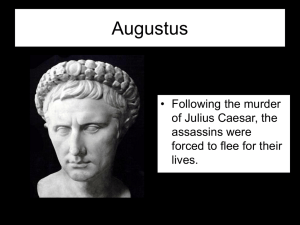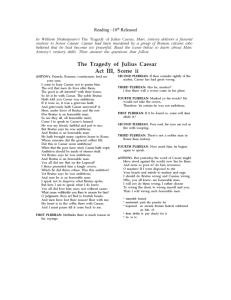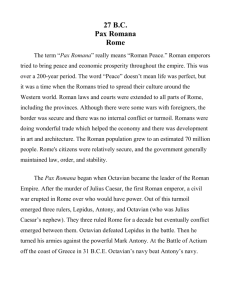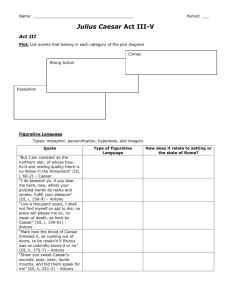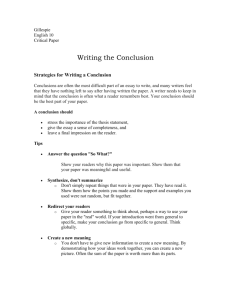Marc Antony
advertisement
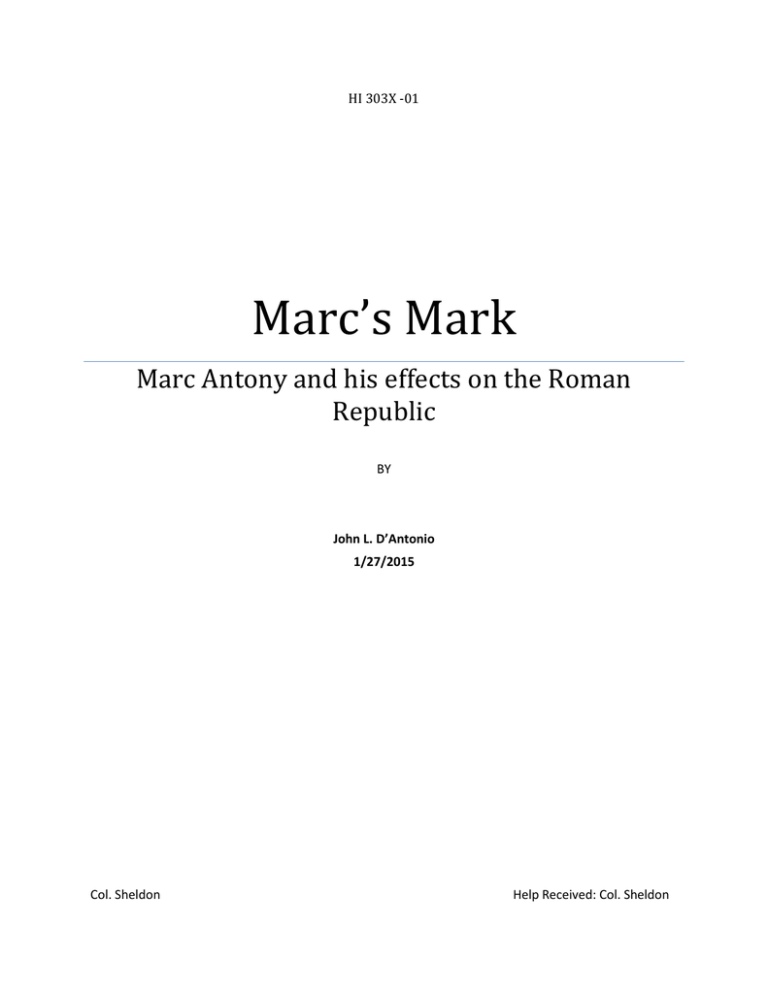
HI 303X -01 Marc’s Mark Marc Antony and his effects on the Roman Republic BY John L. D’Antonio 1/27/2015 Col. Sheldon Help Received: Col. Sheldon 1 The Roman Republic and Empire have a deep history full of inspiring, cruel, interesting and horrific individuals. Of all the cutthroat Romans, one name in particular stands out to me and that is Marcus Antonius, born son of a Roman Praetor in 83 B.C and more commonly known as Marc Antony. Legate under Julius Caesar, Tribune of the Plebs, member of the Second Triumvirate, lover of Cleopatra and contender for the seat of emperor, Marc Antony has left his mark on the empire as one who has played both sides to win and in the process caused situations to worsen. He did whatever was necessary to attain more personal power for himself, whether it was allaying with former enemies or assisting in the brutal slaughter of thousands of Roman citizens in revenge of the death of Caesar1. This self-serving attitude is what caused thousands of Romans to die in a civil war, and by the end, the republic would never be the same. Early on, Marc Antony’s thirst for power was evident; he was beginning to leave his mark on the Roman Republic. The first instance of this is the events that followed the death of Caesar in March of 44 B.C. Marc Antony had fled the city dressed as a slave for fear of being hunted down as a follower of Caesar. However, upon realizing that the members who had so quickly fallen upon Caesar were hiding in the city instead of attacking his followers, he turned around and convinced them to meet by trading his own son as a hostage to the murders of Caesar. After this he met with the senate and convinced them to grant amnesty and distribute provinces to key members of the rebel group, namely Brutus and Cassius.2 Antony was cheered as a hero when he exited the senate chambers for bringing about a peace following the murder of the emperor. He had restored peace to the Republic and could have left it there; however, it seems that he had a different plan for Rome. After obtaining permission to hold Caesar’s funeral in public, Marc Antony proceeded to whip the crowd into such a fury against the members who 1 2 “Mark Antony”, Wikipedia, 1/27/15, http://en.wikipedia.org/wiki/Mark_Antony Plutarch, Antony, 14.1 – 14.2 2 assassinated Caesar, that they burned down the houses of the assassins causing many of them, including Brutus and Cassius, to flee the Italian Peninsula in fear for their lives.3 From here Marc Antony, took control of Rome and in an autocratic fashion, issued decrees, pardons, and sentences all in the name of Caesar, for Antony had obtained the documents of the dead emperor and proceeded to claim that all that he carried out was in the name of the long dead dictator. As the sole consul and with his brothers in the positions of tribune and praetor, he was able to assign senators and conduct executions with impunity.4 However not all were content with this arrangement. Marcus Tullius Cicero, a member of the senate, conducted fourteen speeches against Marc Antony and questioned why he thought he could conduct the affairs of a dead dictator. Speeches such as this began to sow dissent among the people and the senate. Cicero and the other enemies of Antony began to build a following until there was tension all throughout Rome. Finally came a day in May when young Octavian, heir to Caesar, arrived in Rome demanding all that Caesar had left him. There was now another contender for power in Rome; the Republic was slowly losing the style of government they had boasted for so long to power hungry men such as Antony. This could have been easily avoided if Antony had kept his agreement regarding Caesars assassins, the agreement he had received so much praise for. Let us now fast forward seven months to December of the same year. Antony has marched north to seize control of Gaul from one of the assassins of Caesar who had earlier been given amnesty. After besieging the Roman army there, the senate, led by Cicero, declares him an outlaw and dispatches an army which defeats him. At this point the republic has fractured into several smaller pieces, arguably because of the actions of Marc Antony. On one side is the 3 4 Plutarch, 14.3 – 15.1 Plutarch, 15.1 – 15.3 3 members who were loyal to Caesar fighting among themselves, Antony, Octavian, and Lepidus. On the other side, Brutus and Cassius are in the east jointly holding territory under the name the Liberators. Finally Sextus Pompey holds the majority of the Roman fleets at Sicily. Antony forms an alliance with first Lepidus and then eventually Octavian as the infighting of the Caesarians slowly dies down. They then the divide the Empire into three parts, this becomes known as the Second Triumvirate. The fate of the Republic is now sealed and it will never return to what it once was. Their first order of business is to begin arguing as to who gets to exact vengeance again the Liberators, the assassins of Caesar.5 Eventually the Liberators are caught and their armies defeated, both Brutus and Cassius commit suicide before being captured. Hungry for more power, Antony and Octavian have Lepidus ousted as a member of the Triumvirate and send him to be governor of Africa.6 All seems to be well in Rome until Marc Antony’s true colors begin to show once more as he attempts to obtain more power. His wife who has remained in Rome, has begun attempting to rally the senators against Octavian on his behalf. Antony, obtaining funds from Egypt, the land of his lover Cleopatra, launches a failed campaign against the Parthians and then another against Sextus who he executes without trial. After one more successful campaign against Armenia, Antony commits the ultimate mistake and severs his treaty with Octavian, believing his new wealth from Egypt will assist him in taking all of Rome and its territory for his own. This move was extremely unpopular with the army and navy and Antony lost the majority of his troops. Following a brief political struggle in Rome during 33 and 32 BC, war is declared between the two factions. Antony soon lost most of his territory in the east, specifically all of his territory in Greece. He was finally hunted down by 5 6 Plutarch, Antony, 19.1 Wikipedia, Marc Antony 4 Octavian’s general Marcus Agrippa after a loss on the seas at Actium.7 In 30 BC, Octavian invades Egypt, Antony’s last remaining territory. Realizing he was lost and falsely believing Cleopatra to be dead, Marc Antony disemboweled himself with his own sword8 This end, led Octavian to have absolute power, thus the Roman Empire was born. Marc Antony leaves his mark on the Roman Republic in the form of his greed. His greed shatters the peace by his betrayal of the agreement with Brutus and Cassius, leading to the death of thousands of Romans in a civil war. The Republic is split into half a dozen pieces almost completely due to his actions. Even after the dust settles and the Republic has settled into two parts, his and Octavian’s, Antony had to grab for power once more and deal the finishing blow to that which was the Roman Republic. For all of his greed and all of his skill, it would ultimately lead to his downfall and Rome would never be the same. 7 8 Wikipedia, Marc Antony Plutarch, Antony, 77.3-77.4 5 Bibliography Cicero, Orations, The fourteen orations against Marcus Antonius (Philippics) trans. C. D. Yonge. London. George Bell & Sons. 1903. “Marcus Antonius Creticus”, Wikipedia, 2/8/15, http://en.wikipedia.org/wiki/Marcus_Antonius_Creticus “Mark Antony”, Wikipedia, 1/27/15, http://en.wikipedia.org/wiki/Mark_Antony Plutarch, Antony, trans. B. Perrin, Cambridge: Harvard University Press, 1921. Plutarch, Comparison of Demetrius and Antony, trans. B. Perrin, Cambridge: Harvard University Press, 1920.
